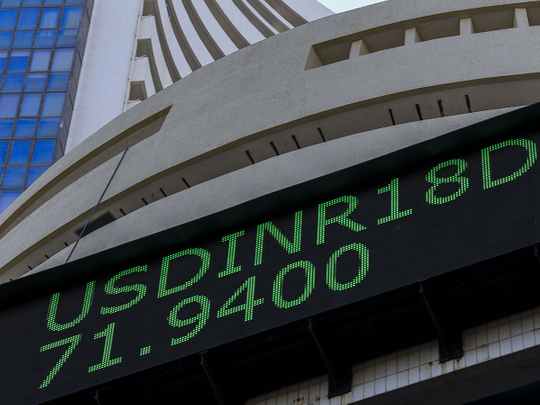
MUMBAI: Indian markets recouped sharp early losses by mid-morning Tuesday as election results in three states were not as poor for the ruling party as some expected, but anxiety about the central bank governor’s resignation kept sentiment subdued.
Markets initially plunged in reaction to Reserve Bank of India Governor Urjit Patel’s unexpected resignation late on Monday, which shocked many investors.
“Patel’s resignation bodes poorly for macroeconomic and financial stability in India,” Fitch Solutions Macro Research, a unit of Fitch Group, said in a note on Tuesday.
The broader NSE stock index tumbled as much as 1.47 per cent, but at 0752 GMT was up 0.5 per cent.
The Indian rupee had dropped 1.5 per cent to a one-month low of 72.4625 per dollar in early trade, but pared most losses to be 71.76 versus its previous close of 71.35.
It touched the day’s high of 71.68 with some dollar-selling intervention by state-run banks on behalf of the RBI also helping.
The benchmark 10-year bond yield was down 7 basis points on the day at 7.52 per cent after initially rising as high as 7.71 per cent.
“Today’s reaction by the markets is surprising to some, but it’s a classic ‘buy the rumour, sell the news’ reaction. The news is already in the market price,” Sunil Sharma, chief investment officer at Sanctum Wealth Management, New Delhi.
Patel’s resignation came after a month-long tussle over policy with the government that has raised concerns about the central bank’s independence as a national election nears.
Government officials had been pressuring the RBI to allow some public sector banks laden with bad debt to lend more easily, and pushed for the central bank to hand over some of its surplus reserves to help fund the fiscal deficit.
“Though both parties have valid arguments on their points of view, the sudden resignation raises questions on whether the Indian government is trying to restrain public institutions and undermine RBI’s independence,” said Anuja Munde, portfolio manager at Nikko Asset Management in Singapore.
“This resignation, along with political uncertainty, will keep the market volatility elevated in the run-up to the 2019 general elections.” But after early Tuesday tumble in the wake of Patel’s resignation, and as election results from three Indian states came in, the market changed course.
A senior trader at a large state-run bank said they had been buying debt as all negative news that had been feared has been delivered.
“Now we have to look forward. Markets are now being governed by macro fundamentals which look good as oil is stable and no rate hikes are expected any time soon.” India’s ruling Bharatiya Janata Party (BJP) could lose power in the three key states, four TV networks said on Tuesday, citing votecount leads, potentially handing Prime Minister Narendra Modi his biggest defeat since he took office in 2014, and months ahead of a general election.
Still, some analysts thought the results would be worse for Modi and BJP.
“Uncertainty from the elections seem to be behind us now. If it had been a whitewash, with high margins of defeat for the BJP, then markets would have been under more pressure,” said S. Krishnakumar, chief investment officer for equities at Sundaram Asset Management in Chennai.











